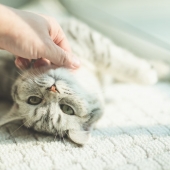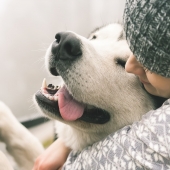Is it anxiety? Or is it something else?
Unfortunately, many of the symptoms below are also common to various diseases and health conditions. If you’re concerned about your pet’s well-being, contact your veterinary clinic. Once any underlying medical issues have been ruled out, your veterinarian’s advice can help you manage your cat’s anxiety.
1. Your cat stays in hiding.
A cat that no longer naps in their favourite spot in the sun or on the couch—and instead spends a lot of time in dark and hard-to-reach places, such as in the basement or under the bed—may not feel safe. Seeking solitude and hiding is a typical response to perceived danger.
2. Your cat is excessively vocal.
You can expect your cat to meow when hungry or trying to get your attention. Such vocalization typically has a plaintive quality, whereas stress-induced vocalization sounds more insistent, tense, and troubled. It may sound familiar if you’ve ever heard your cat meow while attempting to ward off another cat.
3. Your cat shows unusual aggressiveness.
If your usually calm and mellow cat starts acting aggressively with no warning, they may be on edge. Your cat could snap at other pets in the house, scratch, and bite harder than usual during playtime or take a swipe at you for no apparent reason when you’re walking by.
4. You notice habit changes in your cat.
Just as with humans, stress may influence your cat’s appetite. Some pets will eat less or refuse to eat their favourite snacks when feeling anxious. Others will seek comfort in food and eat more than usual. Over time, such changes can lead to weight loss or obesity. Stress may also cause diarrhea, constipation or inappropriate elimination such as defecating or urinating outside their litter box.
5. Your cat follows you around constantly.
Cats who are used to their owner staying home, who have been previously abandoned or who find themselves in a new environment can be prone to separation anxiety. You may also notice your cat becoming overly attached or following you from room to room when feeling anxious.
6. Your cat’s body language shows tension.
Your cat may express their anxiety through multiple physical signs—some obvious, and others more subtle. They may hold their tail close to their body, avoid eye contact, pull back their ears or move them to the side, have rippling, twitching skin on their back, have dilated pupils, breathe more quickly or freeze in place. Become familiar with your cat’s “normal” body language, so you can more easily recognize when something’s off.





